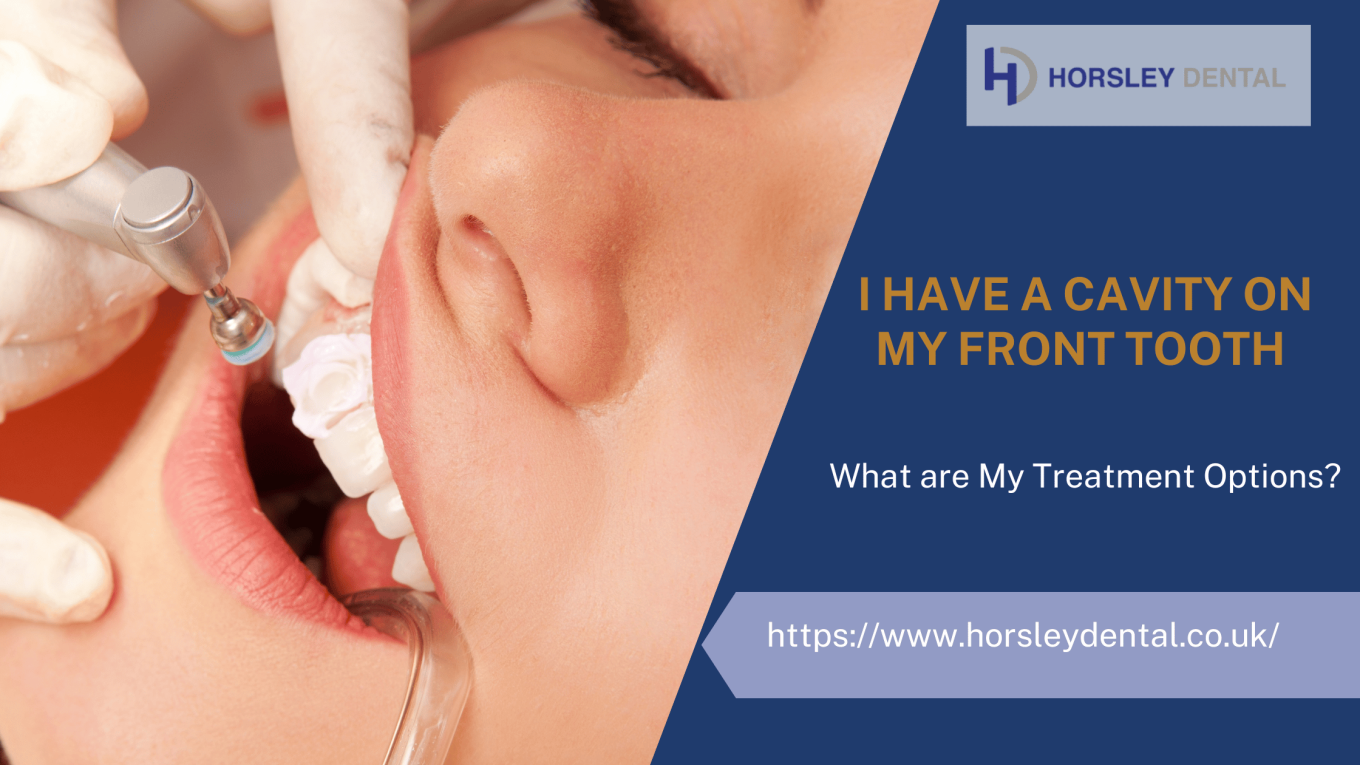I Have A Cavity On My Front Tooth: What Are My Treatment Options?
Dental cavities are one of the most common dental problems in the UK. According to the Oral Health Foundation, 1 in every 3 British adults suffers from tooth decay. Dental cavities can negatively influence one’s quality of life. More importantly, dental cavities, especially on the front teeth, can affect one’s smile and facial aesthetics. If you or a loved one wants to know about “how to treat a cavity on my front tooth”, then this blog is for you. So, continue reading to learn what causes front tooth cavities and how to treat them.
What Are The Causes Of Cavities On The Front Teeth?
A tooth cavity develops because of plaque and tartar deposits on the teeth. Harmful bacteria in plaque and tartar release toxins that make the oral environment acidic. As a result, the minerals in the outer protective enamel layer of the teeth move into the oral cavity, leaving the teeth weak and vulnerable. Over time, the weakened enamel is destroyed, and cavities start to form on these teeth. Cavities on the front teeth form the same way they develop on the back teeth: due to poor oral hygiene maintenance.
Can You Have A Cavity In Only One Tooth?
It is possible to have a cavity on a single tooth. This can happen when a tooth is misaligned. Such teeth are difficult to clean due to their abnormal position. Such teeth are more vulnerable to plaque and tartar formation, leading to a higher risk of tooth decay and gum disease.
Why Do I Have Cavities If I Take Great Care Of My Teeth?
Some people get tooth cavities even though they brush and floss regularly. This can be because they aren’t following a proper brushing or flossing technique. It is essential to learn the correct way to brush your teeth from your dentist or hygienist to ensure that your teeth are clean, healthy, and plaque-free.
How Are Dental Cavities In The Front Treated?
Aesthetics are of paramount importance when treating front tooth cavities. For small-sized cavities, dentists use tooth-coloured bonded fillings or porcelain veneers to restore the teeth. For larger cavities, your dentist may consider dental crowns to reinforce the tooth and restore the aesthetics. So, the treatment of cavities on the front teeth mainly depends on their extent.
Do I Need A Root Canal Or Just A Filling For A Front Tooth Cavity?
Dental cavities in which the underlying dentine and pulp layers, which contain the nerve endings and blood vessels, are not exposed, don’t require root canal treatment. However, a root canal procedure may be required if there is a large tooth cavity where the enamel is destroyed, and pulp tissue has become irreversibly inflamed. According to the NHS, root canal treatment involves removing inflamed pulp from the teeth and replacing it with an inert material.
How To Avoid Getting Cavities On Your Front Teeth?
The best way to prevent tooth cavities on the front teeth is to ensure optimal oral hygiene. Dentists recommend brushing your teeth twice a day with a fluoride toothpaste. Moreover, one should floss at least once a day. Doing so helps remove plaque from the interdental spaces and prevents dental complications such as tooth decay and gum disease. You should also visit your dentist regularly for checkups so that developing dental cavities can be diagnosed and treated timely manner.
Is A Tooth Implant The Best Solution For A Cavity?
A dental implant is not a treatment option for a tooth cavity. This is because an implant is needed when a tooth is lost. On the other hand, dental cavities are restored by filling the damaged portion of the tooth with a suitable restorative material.
How Painful Is Teeth Cavity Removal?
Shallow dental cavities, where the enamel isn’t destroyed, don’t cause pain when removed. However, deep cavities where the dentine and pulp are exposed can be painful. In such cases, dentists make the affected teeth pain-free by administering local anaesthesia. Your dentist will look at the X-ray images of your teeth before restoration, so that they can have an idea whether the sensitive layers of the teeth have been exposed or not.
Do I Need Dental Care If There Is A Tiny Chip In My Front Tooth?
If you have a tiny chip on your front tooth, you should get it restored immediately. Why? Because a small chip may grow larger over time, leading to an extensive tooth fracture. Alternatively, the chip may grow larger and expose the underlying dentine and pulp, making the tooth sensitive. Therefore, small tooth cavities and chips should not be taken lightly and must be restored without delay.
Can A Cavity Form Under A Dental Crown?
A cavity can form under a dental crown. This can occur due to two main reasons: poor oral hygiene and significant space between the supporting tooth and the crown. Such cavities are called secondary tooth cavities. Unfortunately, secondary tooth cavities only become apparent when they cause pain and sensitivity. The management of such cavities involves removing the crown and restoring the decayed tooth.
If you have one or more front teeth with cavities that affect your smile and self-confidence, let Horsley Dental in Surrey take care of it for you. Our experienced and highly trained dentists will take care of all your dental needs under one roof. Book a free consultation with us today and let us give you the smile you genuinely deserve.

BSC, BDS (KING’S COLLEGE LONDON), MJDF RCS (ENG)
PRINCIPAL DENTAL SURGEON, GDC NO: 177407
Shiral qualified from King’s College London with degrees in Biomedical Science in 2004 and Dentistry in 2009. Shiral went on further to complete her membership in the joint dental faculties (MJDF) examinations with the Royal College of Surgeons. Shiral has undergone extensive training in both practice and hospital.
Shiral is the new Principal owner of Horsley Dental, your local Leatherhead dentist.


